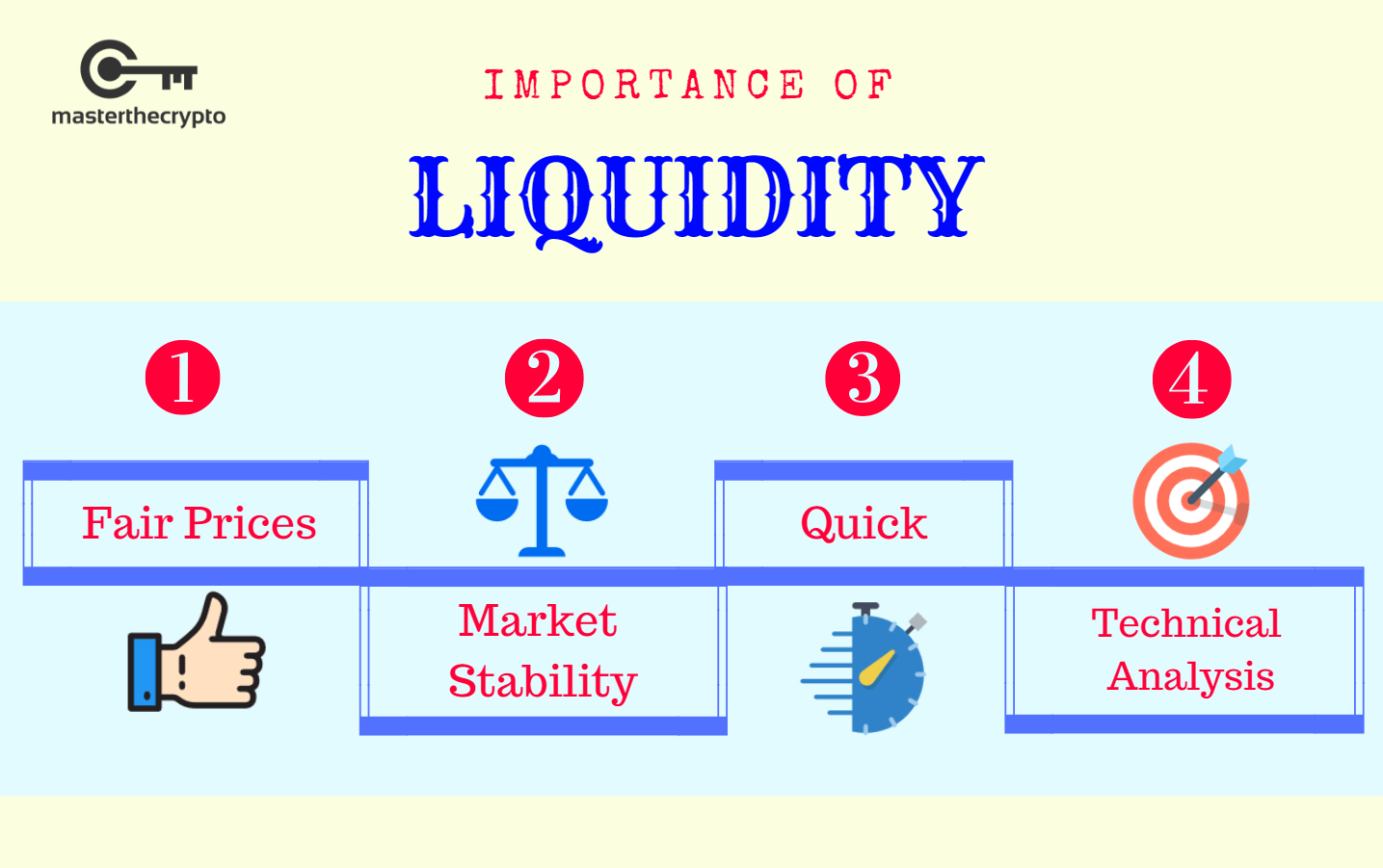This guide to cryptocurrency liquidity takes a look at understanding liquidity at a deeper level, so as to familiarize oneself with the importance of liquidity as being one of the most pressing concepts in the cryptocurrency world.
Introduction to Liquidity
Liquidity represents one of the most important concept – aside from market capitalization – that everyone needs to understand when trading or investing cryptocurrencies. Liquidity is the degree to which a particular asset can be quickly bought or sold without affecting the general stability of its price. In simplest terms, liquidity refers to the ability of an asset to be converted into cash easily. The most liquid asset in existence in cash, since it is very stable and can be readily accessed and easily spent on buying, selling, paying debts or meeting immediate wants and needs. Therefore, cash is commonly used as the standard to gauge an asset’s liquidity.

A common similarity among liquid assets is that they all have a ready and open market to be traded on. This means that all these assets are heavily traded globally in different exchanges with stable prices. For non-liquid – or illiquid – assets, they are usually not traded in public exchanges but are more commonly traded privately. This means that prices of illiquid assets can vary by a huge margin and can take a significant amount of time to complete. Essentially, the harder it is for an asset to be turned into cash, the more illiquid it is.
Liquidity refers to the ease in which you can enter or exit into a particular asset or currency.
(Read also: Bitcoin vs Alt Coins Returns: Comparison of Gains Between Bitcoin & Altcoins Investing)
Importance of Liquidity
In the context of cryptocurrencies, liquidity refers to the ability of a coin to be converted into cash or other coins easily. Liquidity is important for any tradeable assets including cryptocurrencies. A higher liquidity in the marketplace is preferred since it brings about the following advantages:

-
Better and Fair Prices for Everyone
In a liquid market, prices are much fairer for market participants due to a large number of buyers and sellers. For instance, a robust marketplace with high trading activity ensures that sellers would sell at competitive prices (so as not to lose out) while buyers would bid at higher prices (according to their level of desperation), thereby creating an equilibrium market price that is equitable for all. A stable equilibrium price is a sign of market stability and ensures that market participants are not disadvantaged.
(See also: Tokenization of Everything: How Tokens Will Create a More Liquid World)
-
Market Stability
High liquidity ensures that prices are stable and will not be prone to large swings in the market due to large trades. For instance, it is very easy for “Whales” (term for individuals with huge amounts of money) to significantly influence prices – or worse, manipulate prices – in illiquid markets that have little market activity. A single buy or sell order would create large swings in the cryptocurrency prices, which contributes to increased volatility and risks for the general market. In a liquid market, prices are stable enough to withstand large orders due to the presence of many market participants and their orders.
-
Quicker Transaction Times
It’s much more convenient and easy to buy or sell the cryptocurrency of your choice in a liquid market since your buy or sell orders would be filled much faster due to the greater amount of market participants. You can quickly enter or exit a trade instantaneously, which is sometimes critical in the fast-paced cryptocurrency markets.
(Read also: Crypto Beginners Guide: 5 Things Crypto Newbies Should Know)
-
Increased Accuracy for Technical Analysis
Technical analysis refers to the study of past prices and the use of technical indicators and charting patterns to predict cryptocurrency prices. Though many disagrees with the accuracy of technical analysis, it is still a widely-used methodology in understanding the general market and trading. Price and charting formation in a liquid market is more developed and precise, thereby enhancing its accuracy.
The Foreign Exchange (FOREX) currency market is the most liquid market with an average trading volume of over $5 trillion daily!
(See also: Beginner’s Guide to ICO Investing: How to Participate in ICOs)
Factors That Affect Liquidity
-
Trading Volume
Perhaps the core factor that affects liquidity in the cryptocurrency market is a fact that the majority of those who own cryptocurrencies engage in investing and trading coins for price appreciation rather than use them as a medium-of-exchange. Volume refers to the amount of coins that have been traded in exchanges usually in the past 24 hours timeframe. Essentially, the volume reflects the market activity of a specific coin; a higher volume indicates that more people are buying and selling the coins.

-
Cryptocurrency Exchange
An exchange is a marketplace where assets are traded freely between buyers and sellers. A higher number of cryptocurrency exchanges signifies greater market (and trading) activity since there are more avenues that individuals can get their hands on cryptocurrencies. The increase in frequency and volume of trading helps to enhance market liquidity. There are currently over 200 cryptocurrency exchanges, 21 decentralized exchanges and a handful of peer-to-peer (P2P) platforms in existence today. There are many other exchanges that are currently work-in-progress and due to launch in the near future.

(Read more: Guide to Margin Trading & Derivatives: Are Cryptocurrency Exchanges Really Manipulating?)
-
Acceptance
The success and viability of any currency depend on the acceptance of the masses or at least a huge network of individuals that can actually use it for something. That is why it is important for cryptocurrencies to be accepted by merchants and businesses as a mode of payment, so as to increase the usability and utility of cryptocurrencies as a viable medium for transactions. Bitcoin and other cryptocurrencies are fast gaining traction and acceptance as a mode of payment, particularly in online stores. This current moment, there are more than 370,000 vendors across 182 different countries that accept payments in cryptocurrencies, including giants such as Amazon, IBM, Microsoft, Apple’s app store, PayPal, and eBay.

-
Regulations
The laws and regulations of different countries can also impact cryptocurrency liquidity. There are certain countries that ban either cryptocurrency trading or the use of cryptocurrencies in dealings. This would impair the liquidity in that specific country since a ban on cryptocurrencies equate to a ban on cryptocurrency exchanges, which would mean that it will be hard for users to buy or sell cryptocurrencies in that country. Anyone looking to own cryptocurrencies would have to privately find a seller, or rely on peer-to-peer platforms. Therefore, the liquidity in that country would be extremely low. This usually results in higher prices since there are few sellers to cater to the high demand for cryptocurrencies, which gives the seller a higher bargaining chip to increase prices.

See also: Guide to Cryptocurrency Taxes: A Guide to Common Tax Situations)
In our next article, we will explore how you can use liquidity to your advantage when investing or trading!
Beneficial Resources To Get You Started
If you're starting your journey into the complex world of cryptocurrencies, here's a list of useful resources and guides that will get you on your way:

Trading & Exchange
- Crypto Guide 101: Choosing The Best Cryptocurrency Exchange
- Guide to Bittrex Exchange: How to Trade on Bittrex
- Guide to Binance Exchange: How to Open Binance Account and What You Should Know
- Guide to Etherdelta Exchange: How to Trade on Etherdelta
- Guide To Cryptocurrency Trading Basics: Introduction to Crypto Technical Analysis
- Cryptocurrency Trading: Understanding Cryptocurrency Trading Pairs & How it Works
- Crypto Trading Guide: 4 Common Pitfalls Every Crypto Trader Will Experience
Wallets
- Guide to Cryptocurrency Wallets: Why Do You Need Wallets?
- Guide to Cryptocurrency Wallets: Opening a Bitcoin Wallet
- Guide to Cryptocurrency Wallets: Opening a MyEtherWallet (MEW)
Read also: Crypto Trading Guide: 4 Common Pitfalls Every Crypto Trader Will Experience and Guide To Cryptocurrency Trading Basics: Do Charts & Technical Analysis Really Work?
Get our exclusive e-book which will guide you on the step-by-step process to get started with making money via Cryptocurrency investments!
You can also join our Facebook group at Master The Crypto: Advanced Cryptocurrency Knowledge to ask any questions regarding cryptos!

I'm Aziz, a seasoned cryptocurrency trader who's really passionate about 2 things; #1) the awesome-revolutionary blockchain technology underlying crypto and #2) helping make bitcoin great ‘again'!

